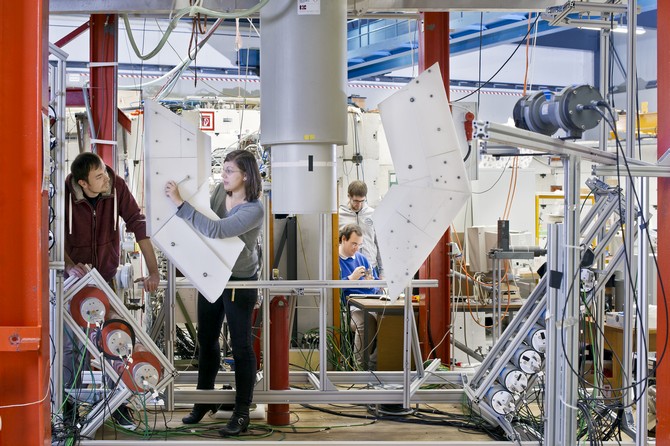Masterstudiengang Physik (Kern-, Teilchen- und Astrophysik)

Der Masterstudiengang Physik (Kern-, Teilchen- und Astrophysik) ist auf zwei Jahre angelegt. In diesen zwei Jahren werden Sie Gelegenheit haben, sich einerseits die fachlichen Grundlagen anzueignen, und andererseits werden Sie wesentliche Einblicke in die aktuelle Forschung aus dem ganzen Spektrum der Kern-, Teilchen- und Astrophysik gewinnen.
Spezialisierungsgebiete
Die Studierenden können sich in einem der folgenden Bereichen spezialisieren:
- Teilchen- und Astrophysik -- unter anderem Themen wie Astrophysik, Astroteilchenphysik, Hochenergie-Neutrino-Astronomie
- Experimentelle Kernphysik -- unter anderem Themen wie Teilchendetektoren, Anwendungen in interdisziplinärer Forschung, ultrarelativistische Schwerionen Kollisionen
- Experimentelle Teilchenphysik -- unter anderem Themen wie Tests des Standardmodells, kosmische und erdgebundene Beschleuniger, moderne Detektoren, Datenanalyse und Monte-Carlo-Methoden
- Theoretische Teilchenphysik -- unter anderem Themen wie Gruppentheorie, Quantenfeldtheorie, Quantenchromodynamik
Typische Studienpläne
Das Curriculum des ersten Studienjahres kann mit der Hilfe eines Mentors individuell gestaltet werden. Die folgenden Curricula geben beispielhaft wieder, wie das erste Studienjahr im Masterstudiengang Kern-, Teilchen- und Astrophysik aufgebaut sein kann.
Teilchen- und Astrophysik
Studierende mit großem Interese an der Verknüpfung von teilchen- und astrophysikalisch relevanten Themen könnten z.B. folgenden Studienplan wählen:
| Module | Turnus | CP |
|---|---|---|
| Theoretische Physik | ||
| PH1002 Quantenmechanik 2 | W | 10 |
| Spezialfächer KTA | ||
| PH2058 Einführung in die Astrophysik | W | 5 |
| PH2073 Astroparticle Physics 1 | W | 5 |
| PH2074 Astroparticle Physics 2 | S | 5 |
| PH2216 Cosmic Rays and Neutrino Astronomy 1 | W | 5 |
| PH2217 Cosmic Rays and Neutrino Astronomy 2 | S | 5 |
| Spezialfächer Nicht-KTA | ||
| Beratung durch Mentor(in) | 10 | |
| Proseminar, Fortgeschrittenenpraktikum und Nichtphysikalische Wahlfächer | ||
| Beratung durch Mentor(in) | 4 + 6 + 8 | |
Experimentelle Kernphysik
Studierende mit großem Interese an Fragen der experimentellen Kernphysik könnten z.B. folgenden Studienplan wählen:
| Module | Turnus | CP |
|---|---|---|
| Theoretische Physik | ||
| PH1002 Quantenmechanik 2 | W | 10 |
| Spezialfächer KTA | ||
| PH2193 Moderne Detektoren für die Kern- und Teilchenphysik | S/W | 5 |
| PH2190 Ultrarelativistic heavy-ion collisions | W | 5 |
| PH2208 Gas Detectors: Theory and Application | S | 5 |
| Weitere Spezialfächer und Nicht-KTA-Fächer | ||
| Beratung durch Mentor(in) | 10 | |
| Proseminar, Fortgeschrittenenpraktikum und Nichtphysikalische Wahlfächer | ||
| Beratung durch Mentor(in) | 4 + 6 + 8 | |
Experimentelle Teilchenphysik
Studierende mit großem Interesse an der experimentellen Teilchenphysik könnten z.B. folgenden Studienplan wählen:
| Module | Turnus | CP |
|---|---|---|
| Theoretische Physik | ||
| PH1002 Quantenmechanik 2 | W | 10 |
| Spezialfächer KTA | ||
| PH2044 Tests des Standardmodells der Teilchenphysik 1 | W | 5 |
| PH2045 Tests des Standardmodells der Teilchenphysik 2 | S | 5 |
| PH2081 Teilchenphysik mit kosmischen und mit erdgebundenen Beschleunigern | W | 5 |
| PH2193 Moderne Detektoren für die Kern- und Teilchenphysik | S | 5 |
| Weitere Spezialfächer und Nicht-KTA-Fächer | ||
| Beratung durch Mentor(in) | 10 | |
| Proseminar, Fortgeschrittenenpraktikum und Nichtphysikalische Wahlfächer | ||
| Beratung durch Mentor(in) | 4 + 6 + 8 | |
Theoretische Teilchenphysik
Studierende mit großem Interese an der theoretischen Teilchenphysik könnten z.B. folgenden Studienplan wählen:
| Module | Turnus | CP |
|---|---|---|
| Theoretische Physik | ||
| PH1005 Theoretical Particle Physics | S | 10 |
| Spezialfächer KTA | ||
| PH2040 Relativität, Teilchen und Felder | S | 10 |
| PH2041 Quantum Field Theory | W | 10 |
| Spezialfächer Nicht-KTA | ||
| Beratung durch Mentor(in) | 10 | |
| Proseminar, Fortgeschrittenenpraktikum und Nichtphysikalische Wahlfächer | ||
| Beratung durch Mentor(in) | 4 + 6 + 8 | |
Grundlagenorientierte Plasmaphysik
| Modules | Cycle | CP |
|---|---|---|
| Theoretische Physik | ||
| PH2040 Relativität, Teilchen und Felder | SS | 10 |
| Spezialfächer | ||
| PH2035 Plasmaphysik 1 | WS | 5 |
| PH2036 Plasmaphysik 2 | SS | 5 |
| PH2196 Fusionsforschung | SS | 5 |
| PH2037 Einführung in die Magnetohydrodynamik – Ideale Plasmaeffekte | WS | 5 |
| PH1007 Kontinuumsmechanik | WS | 10 |
| PH2175 Turbulenz in neutralen Fluiden und Plasmen | WS | 5 |
| PH2233 Angewandte Plasmaphysik: Große Wirbel (Zonal flows und andere Strukturen) in Kernfusionsreaktoren, auf dem Jupiter, in Klima und Astrophysik | SS | 5 |
| Proseminar | ||
| PH1326 Plasmaphysik und Fusionsforschung | WS/SS | 4 |
| oder | ||
| PH1376 Seminar Plasma Physics | WS/SS | 4 |
| Fortgeschrittenenpraktikum und Nichtphysikalische Wahlfächer | ||
| Counseling by Mentor | 6 + 8 | |
Individuelles Curriculum
| Module | Turnus | CP |
|---|---|---|
| Theoretische Physik | ||
| Katalog, Beratung durch Mentor(in) | 10 | |
| Spezialfächer KTA | ||
| Katalog, Beratung durch Mentor(in) | 20 | |
| Spezialfächer Nicht-KTA | ||
| Katalog, Beratung durch Mentor(in) | 10 | |
| Proseminar | ||
| Katalog, Beratung durch Mentor(in) | 4 | |
| Fortgeschrittenenpraktikum | ||
| Katalog, Beratung durch Mentor(in) | 6 | |
| Nichtphysikalische Wahlfächer | ||
| Katalog, Beratung durch Mentor(in) | 8 | |